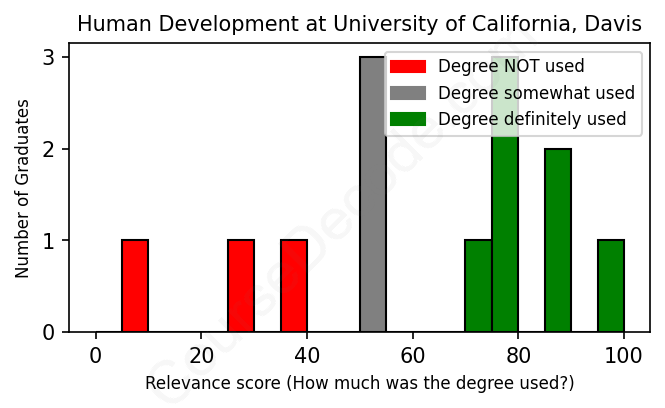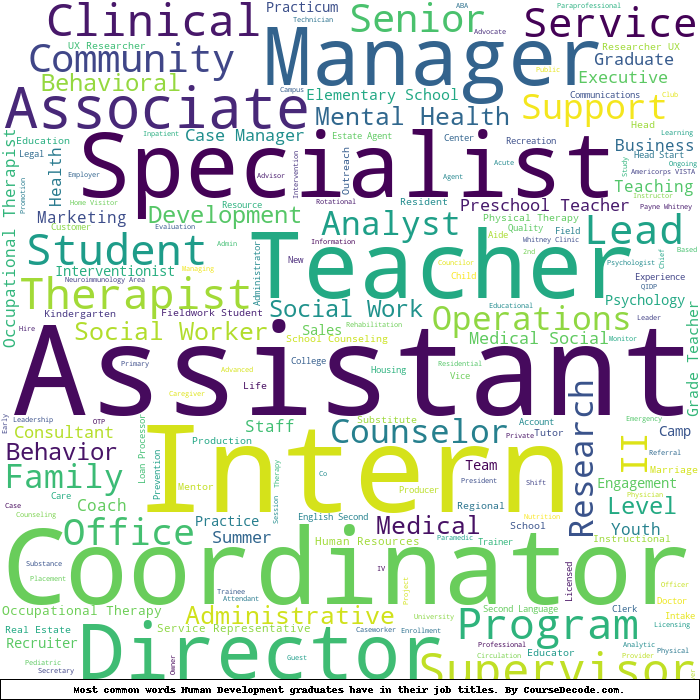
First, some facts. Of the Human Development graduates from University of California, Davis we've analyzed , here's how many have used (or NOT used) their degree in their career:

These are estimates based on AI analysis of 13 LinkedIn profiles (see below).
The verdict? Below average. Overall, with an average relevance score of 61%, Human Development graduates from University of California, Davis have a lower likelihood (-6%) of finding work in this field compared to the average graduate across all fields:
And for comparison, here's the chart for all profiles we've looked at across all degrees.
Also, after graduating, only 30% of these graduates have pursued further education other than another Bachelor's degree (such as a Masters degree or other), compared to the average across all profiles of 35%. This suggests a Bachelors degree is enough for most Human Development graduates, and it's normal to look for work straight after graduation.
See the details:
|
Relevance score: 85% We think this person has gone into a career highly relevant to their degree. We think this person has gone into a career highly relevant to their degree.
DEGREE INFOGraduated in 2015 from University of California, Davis with a Bachelor of Science (BS) in Human Development. No other secondary education since. JOB HISTORY SINCE GRADUATIONReception & Placement Intern International Rescue Committee Jan 2015 - Jun 2015 Department of Defense Child Development Center Intern  Camp Adventure Child and Youth Services Aug 2015 - Dec 2015 Education and Interpretation Intern  American Conservation Experience Aug 2016 - Nov 2016 Environmental Science Educator & Site Manager  NatureBridge Jan 2017 - May 2018 ABOUTNo information provided. |
The top 10 most common jobs done by the graduates we've analyzed (ranked most common to least) are:
Looking through the job histories of graduates with a degree in Human Development from UC Davis, it's clear that many landed roles that are closely tied to the principles of human development, especially in education and mental health. Positions like Resource Specialists in schools, School Psychologists, and various roles as Behavioral Therapists highlight a clear alignment with the knowledge gained during their studies. These jobs involve working directly with individuals to understand and support their developmental needs, making them incredibly relevant to the field of Human Development.
However, there are also quite a few graduates who ventured into roles that strayed from the core focus of their degree. Many found themselves in positions like UX Researchers or various administrative roles, which don't heavily utilize the skills related to human development. While some of these roles might require soft skills or general interpersonal understanding, they often don't dive deep into the theories or practices one might expect from a degree in Human Development. Overall, it seems like graduates found a mixed bag of jobs—some directly related and others more tangentially connected or even unrelated to what they studied.
Here is a visual representation of the most common words in job titles for Human Development graduates (this is across all Human Development graduates we've analyzed, not just those who went to University of California, Davis):

Graduates with a degree in Human Development from UC Davis seem to follow a variety of career paths that mostly align with the themes of education, mental health, and social services. For many, their first jobs after graduation often involve roles such as behavioral therapists, educators, or internships in psychological services. For instance, several early career positions focus on working directly with children or in educational environments, which is great for those looking to use their knowledge of human development practically. Over time, these graduates tend to progress into more specialized roles within the mental health and educational fields. Positions, like those of school psychologists or UX researchers, indicate a shift towards roles that require deeper expertise and understanding of human behavior.
If we look about five to ten years down the line, many graduates continue to build their careers in relevant fields. Some have moved up the ranks within their organizations, taking on roles such as neuroimmunology area managers or mental health clinicians. Others have explored diverse sectors where their skills can be applied, such as UX research in tech companies, showcasing the versatility of a human development degree. While a few individuals have ended up in roles that don't directly tie back to their studies, such as a packer at Amazon, the majority find success in careers that contribute to their field. Overall, it seems that a degree in Human Development can provide a solid platform for a variety of fulfilling careers focused on enhancing the lives of individuals and communities.
Honestly, a Bachelor’s degree in Human Development at UC Davis is about average in terms of difficulty, maybe a bit on the easier side compared to some other majors. You’ll dive into topics like psychology, sociology, and human behavior, which can be super interesting and relatable, but it doesn’t usually involve the heavy math or science courses that some other programs have. There's a good mix of lectures, projects, and group work, so if you’re engaged and enjoy learning about how people grow and develop, you’ll probably find it manageable—and maybe even fun! Just like any degree, you’ll need to stay organized and put in the effort, but it’s definitely doable!
Most commonly, in the LinkedIn profiles we've looked at, it takes people 4 years to finish a Bachelor degree in Human Development.
Looking at the careers of these UC Davis Human Development grads, it seems like they’re mostly in good stead, though their earnings potential varies a lot. Folks who snagged positions in schools or healthcare, like School Psychologists or Medical Social Workers, generally start off with decent salaries, especially if they're in higher-level roles later on. Meanwhile, others, especially those doing tutoring or entry-level jobs at places like Amazon, might not be making bank right out of school. The UX Researcher who climbed the ladder to eventually work at Apple is likely pulling in some serious cash, while roles in education and entry-level positions might not pay as well. Overall, it looks like some of them are doing pretty well, but others might be working their way up the financial ladder.
Here is a visual representation of the most common words seen in the "about" section of LinkedIn profiles who have a Bachelor degree in Human Development (this is across all Human Development graduates we've analyzed, not just those who went to University of California, Davis). This may or may not be useful:

Here are all colleges offering a Bachelor degree in Human Development (ordered by the average relevance score of their Human Development graduates, best to worst) where we have analyzed at least 10 of their graduates:
| College | Score | Count |
|---|---|---|
 Virginia Tech Virginia Tech
|
81 | 12 |
 University of California, Davis University of California, Davis
|
61 | 13 |
 Binghamton University Binghamton University
|
59 | 14 |